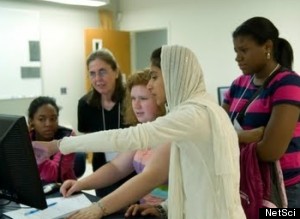We all know networks facilitate human communication, deepen insight into the human condition, and solve myriad problems in business and society on timescales of seconds. But increasingly, the same ideas about how these connections are made are being leveraged against the most complex and pernicious problems of our time.
The science of complex networks, also known as "Network Science," seeks patterns in a variety of data and leverages them against large-scale knowledge management and discovery. It is used in business, medicine, policymaking, and virtually all complex science disciplines today. Network Science helps us understand everything from the structure of the human mind, to the origins of cancer, to the growth of cities, to our impact on the environment.

In collaboration with Cisco CSR, The New York Hall of Science (NYSCI) and colleagues at Binghamton University, Boston University and the Network Science Center at West Point are working to expand a program to bring powerful, but hitherto elite network science ideas into the lives of high school teachers and students for preparing the next generation of scientists and policymakers to solve humanity's greatest challenges.
Affectionately known as "NetSci High," the program started as a small research competition back in 2011 with only 13 students and teachers, but has grown to over 80, It's a rigorous program in which we train teams of students to learn data gathering, computer programming, modeling and analysis using a variety of computer-based tools along with the theory and techniques that help them do original research in network science. An important aspect of the program is to train high school teachers in both network science and research mentorship skills, so they can help students identify research pathways and solve problems throughout the experience.
The student teams work in collaboration with university research labs and graduate student mentors in completing the research. High school student and teacher teams have done research in protein interaction networks, intercellular communication networks, social networks, and technological networks at places like Harvard, Columbia, City University of New York, SUNY Binghamton, and Boston University. They have presented internationally at some of the most important scientific conferences on complexity and network science, to policymakers and published in the peer review journal PLoS One. Initial results of the program indicate that:
- Network science is teachable to diverse groups of high school students and is a compelling way into understanding complex data-driven sciences that motivates and empowers students to solve real-world, complex problems,
- Network science motivates students to learn computer programming through purposeful research projects, even students who did not think of themselves as computer programmers, and
- Network science represents a way to increase interest in science, technology, engineering and math among underrepresented populations (minorities, females, and first generation immigrants).
In 2012, NetSci High inaugurated a relationship with the Cisco Networking Academies in New York City and chose Chelsea Career and Technical Education High School to participate in the program. We recruited a team of Networking Academy students to train and work with scientists on a yearlong complex network research project with Stevens Institute's Howe School of Technology Management.
Their project will trace the evolution and movement of rumors on Twitter. The percolation of rumors in social networks of all kinds is of huge importance to society and having access to millions of Twitter feeds, their interconnections and changing content, has implications for everything from national security to marketing to education.
This will culminate in students presenting the results of their research at conferences to some of the most important network scientists next year. The Chelsea students have participated in a rigorous summer workshop at Boston University where they learned programming, modeled and analyzed networks, and brainstormed about research projects with Stevens Institute researchers. The fundamentals they learn in the Cisco Networking Academy give them an advantage in reasoning skills, handling command line programming and building and analyzing network models. NYSCI and Cisco are partnering to expand this relationship to other Networking Academy teachers and students. With the help of the Cisco Networking Academies, Cisco is helping NetSci High expand its impact through Cisco's educational ecosystem.
The initial success and enthusiasm of Chelsea experience is not only helping to bring scalability to NetSci High, but is bringing together interdisciplinary teams of teachers in a workshop hosted by NYSCI to brainstorm about ways that putting a network science lens on existing high school curricula can help revolutionize instruction through 21st century STEM skills.
By building on the success of the Cisco Networking Academies, and leveraging emerging platforms for instruction, collaboration and video conferencing, NYSCI and Cisco hope to bring the power of network science to expanding groups of high school students and teachers and eventually lifelong learners throughout the country and the world, helping to facilitate a revolution in both learning and science.
NetSci High is supported by the National Science Foundation. For more information, click here.